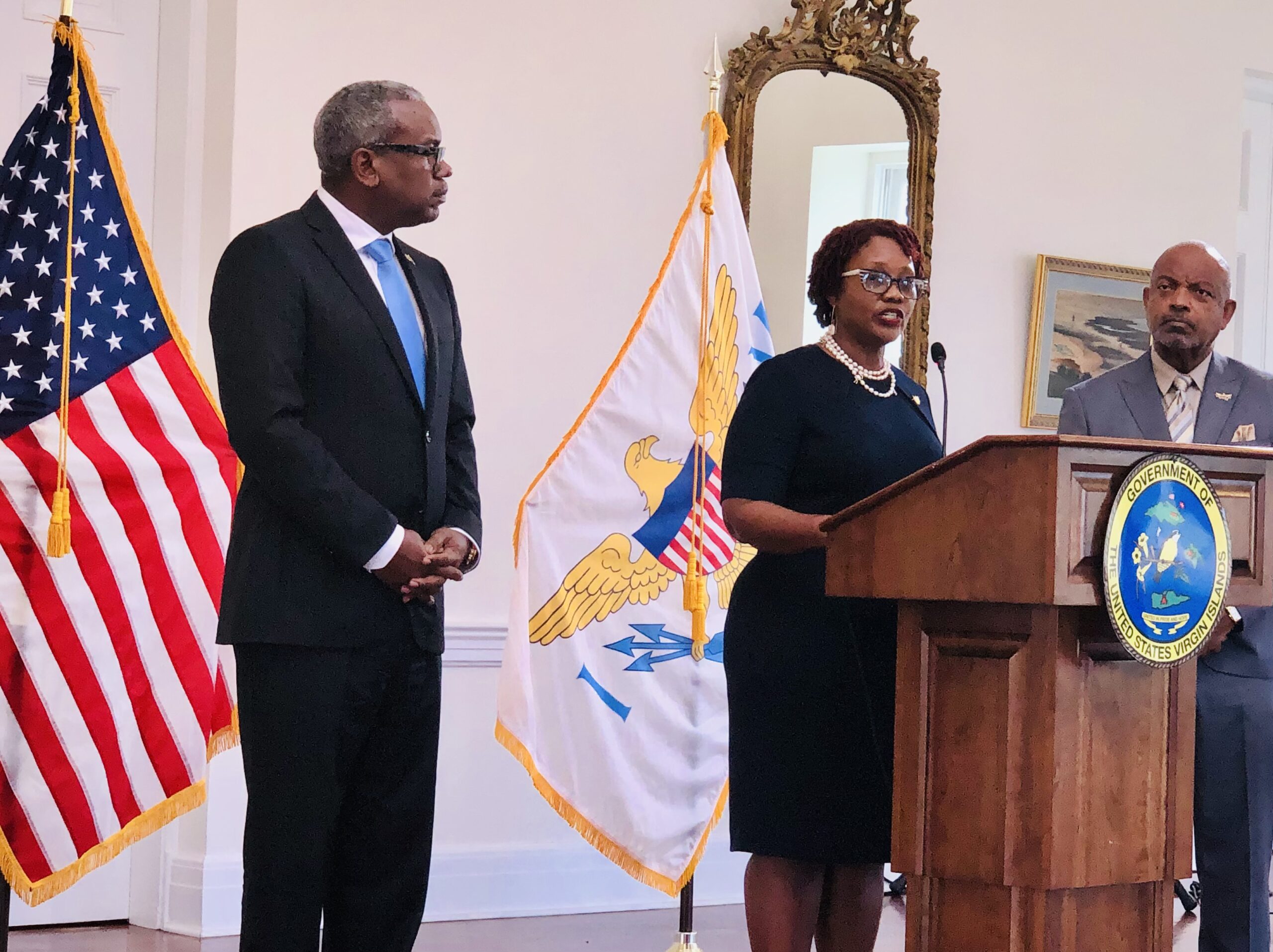
Gov. Albert Bryan Jr. on Thursday announced a new initiative to combat human trafficking in the Virgin Islands. Flanked by Lt. Gov. Tregenza Roach and Attorney General Ariel Smith, the governor announced that proceeds from the recent sale of two cays in Pillsbury Sound will be used to fund that crime-fighting effort.
The governor called human trafficking a worldwide problem and said the Virgin Islands was not exempt from its impact. At a press briefing held in the ballroom of Government House on St. Thomas, Bryan outlined provisions of the Human Trafficking Prevention Act.
A draft of the proposed legislation was expected to be available by Thursday afternoon. If passed by the Legislature and signed into law, there would be mandatory reporting of suspected crimes by those considered likely to encounter trafficking victims. It would create a reporting system through the 911 emergency call line.
“Awareness is our greatest weapon … it is our citizenry that can first identify suspect behavior and notify the proper authorities,” Bryan said.
The trafficking prevention act would support a public awareness campaign led by the Justice Department. Some of the print promotion materials being developed were shared with viewers of the governor’s Thursday briefing over social media.
That provision is similar to an ongoing federal initiative called the Blue Campaign, implemented through the U.S. Attorney’s Office in the Virgin Islands in 2018.
And, Bryan said, the act would require registered sex offenders to inform Justice officials if they travel in the company of minors. Discussions with federal law counterparts will have to take place before any action takes place in that area, the governor said.
Smith said funds obtained by the government litigation against the assets and estate of convicted sex offender Jeffrey Epstein will be used to implement changes if and when the trafficking prevention act becomes law. Epstein died in 2019 of an apparent suicide while in federal custody. Since then, local Justice officials have filed civil lawsuits to recover funds awarded to Epstein through the Economic Development Authority.
Portions of those funds were used to help some of Epstein’s victims. On Thursday, Smith pointed to actions taken by Justice to compensate women and girls who have filed successful claims against Epstein’s estate.
But the attorney general said there is still more left to be done.
“The Victims of Human Trafficking Prevention Act is now funded. It provides for training of local law enforcement on child sexual abuse and trafficking. It will ensure that our law enforcement officials are well equipped with tools and resources they need to stop human traffickers,” the attorney general said.
Funding identified to help these measures along is supposed to come from the settlement reached with Epstein’s estate in November by former Attorney General Denise George. The initial amount was pegged at $105 million plus 50 percent of the proceeds from the sale of Little St. James.
The estate at Little St. James Cay has been identified by victims, and local and stateside prosecutors as one of Epstein’s sex trafficking crime scenes. Since then, the government has received other settlement funds related to the Epstein case.
When asked whether some of those funds — including a reported $62.5 million from Epstein associate Leon Black — would be added to the victim’s compensation fund, Bryan did not respond. Smith suggested it was up to the courts to direct those revenues into that fund.
Through Justice, the government is also pursuing a settlement with JPMorgan Chase bank for $190 million as part of an ongoing civil suit over its business dealing with Epstein.
The governor and the attorney general were also asked if victims of other sex trafficking schemes unrelated to Epstein could also be compensated. “This is a bill that applies to any human trafficker, and there would have to be a separate civil action pursued against them,” Smith said.
Bryan acknowledged that other women and girls had fallen prey to trafficking schemes perhaps less well-known than the one involving Epstein.
“I think it’s a very ignored fact that we have other victims, especially people of Black and Brown complexions that have traversed here … I don’t think there’s a mechanism right now to give those people direct compensation, or whether they remain as undocumented residents of the Virgin Islands,” Bryan said.
But he said the proposed measure is intended to assist others too, and once authorities become aware of their situations, they can also seek relief as crime victims.


